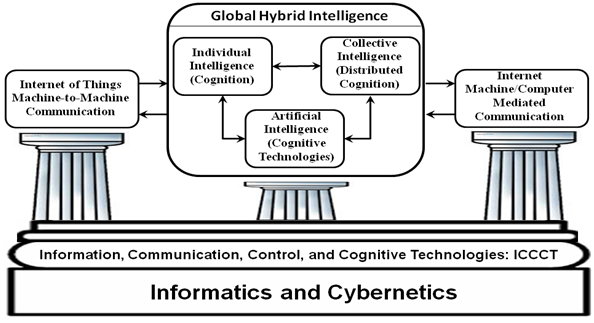|
|
Special Track on
Enabling an Intelligent Planet via
Informatics and Cybernetics: IPIC 2023
|
|
|
|
|
Motivations, Intellectual Perspective, and Aims of IPIC 2023
|
|
What is being called as Intelligent Planet is fundamentally based on what we might call as General or Global Hybrid Intelligence: Individual, Collective, and Artificial Intelligences interacting with each other by means of 1) mediated computer/machine communication (e.g. Internet, e-learning, etc) and 2) what is being called the "Internet of Things" being built upon machine-to-machine communication which is mostly based on smart sensors, smart devises, smart instruments, etc. The following figure provides a visual sketch of what we are trying to describe regarding what has been called "the Intelligent Planet", "The Smart Planet", etc.

Human beings interact with their environment by means of thinking and doing, i.e. via mental and physical activities. Cognitive Science, Engineering and Technologies are increasingly creating hybrid processes for this interaction, where human cognition and cognitive technologies (artificial intelligence, smart tools, smart instrument, and systems, etc.) are combined in order to complement each other, mostly by means of cybernetic loops (co-regulation via negative feedback and feedforward and co-amplification and synergies via positive feedback).
Informatics and Cybernetics are increasingly supporting the transformation of the planet into an Intelligent Planet. Information, Communication, Control, and Cognitive Technologies: ICCCT are providing the means for this support. The Internet-of-things (machine-to-machine, M2M communication) is growing in number of devices and in their smartness level. The Internet and other machine/computer mediated human communication are also growing in quantity, effectiveness, and efficiency. The interaction of Human beings and cognitions are interacting more frequently and effectively among each other and with cognitive technologies, producing a continuously more effective and agile Hybrid Intelligence.
Being the nature of IPIC 2023 a multi-disciplinary one, the basic aim is to organize it for an inter-disciplinary communication oriented to fostering analogical thinking and integrative processes as those mentioned below.
|
|
|
|
|
Purposes of the Organizing Committee
|
|
The Intelligent Planet is a multi-disciplinary set of applications requiring different disciplines as well as inter-disciplinary communication oriented to analogical thinking which is what usually provides input to the logical thinking that frequently characterizes disciplinary research. The integration of these multidisciplinary applications, among themselves and with their context, is in what support the notion of Intelligent Planet, and its design and implementation. Consequently, to purpose of the Organizing Committee is to provide a forum, in the context of a multi-disciplinary conference (e.g. WMSCI, IMSCI, IMCIC, etc.), for inter-disciplinary communication oriented to fostering analogical thinking and potential integration among:
1. Producers of cognitive technologies and cognitive engineers, in order to present their work, solutions, and innovations oriented to augment the component of Artificial Cognition or Intelligence in the interface between human beings and their environment, the Planet.
2. Consumers of present and potential cognitive technologies in order to present their reflections regarding the existent cognitive technologies and to provide input (requirements, problems, etc) for potential future cognitive technologies.
3. Users of cognitive technologies and thinkers to provide their reflections regarding the costs and benefits of these technologies, in general, or in specific cases or concrete technologies.
4. Researchers, professionals, and practitioners in the areas of Cognitive Science, Engineering, and Technologies, as well as in ICCCT, in order to reciprocally share their respective knowledge and experience in these areas in order to foster potential cybernetic loops among them in which they might 1) co-regulate their respective thinking and practice (via communicational negative feedback and feedforward) and 2) co-produce synergies (via communicational positive feedback) in order to conceive new useful applications and/or to re-conceive existent ones so they can be more efficient and/or effective.
5. The presentation of both problems and solutions related to any of the topics below, or the notion of "Intelligent Planet" are encouraged. Some of the attendees might have a solution or an idea or process leading to the solution of a problem presented at the Symposium, and reciprocally some attendees might be interested in the implementation of some of the solutions presented at IPIC 2023.
|
|
|
|
|
Summing up, the general purpose is to provide a multi-disciplinary forum for 1) the potential integration of thinking and doing, research and practice, 2) the possibility of relating problems with potential solutions and vice versa, and 3) the potential integration among different ways of thinking (disciplines) and doing (practical methodologies).
|
|
Suggested Topics
We suggest the following non-exclusionary topics (the word "Intelligence" is used as Artificial, or Human, or Hybrid Intelligence, likewise with the word "cognition"):
- The notion of "Intelligence": Natural (Individual and/or Collective), Artificial, and/or Hybrid Intelligence.
- The notion of "Cognition": Natural (Individual and/or Collective), Artificial, and/or Hybrid Cognition.
- Cognitive Computing.
- Intelligent Systems.
- Big Data
- Cognitive Analytics.
- Business Analytics.
- Intelligent Decisions. Decisions Support Systems.
- Social Business.
- Cloud Computing.
- Cyber-Security.
- Mobil Computing.
- Natural, Artificial and Hybrid Collective Intelligence.
- E-collaboration.
- Intelligent Interactions. Intelligent Networks. Intelligent websites.
- Intelligent Interface.
- Intelligent or Digital Cities: knowledge/Information-based city, electronic community spaces.
- Intelligent Buildings. Intelligent Home. Intelligent Office.
- Intelligent Manufacturing Systems. Intelligent Highway Solutions.
- Robotics. Intelligent Motion Systems. Intelligent Mechatronic Systems.
- Intelligent Devices: Intelligent Tools, Intelligent Instruments and Instrumentation, e.g. cars, medical instruments, geological equipment, home appliances, etc.
- Intelligent Transportation Systems. Intelligent Vehicles.
- Intelligent Medicine. Intelligent Hospital Systems. Intelligent Health Care. Intelligent Medical Devices. Intelligent Medical Software.
Important Information for your Submissions to IPIC 2023
Virtual Participation
Submissions for Face-to-Face or for Virtual Participation are both accepted for the conference. Both kinds of submissions will have the same reviewing process and the accepted papers will be included in the same proceedings, and will have the same selection process for the best papers to be published in the Journal with no additional charge.
Virtual Sessions
Face-to-face sessions of all jointly organized events will have associated virtual pre- and post-conference sessions where registered participants can comment each paper in a forum associated to it. Registered participant at any event will have a password to access any virtual session of any collocated event. Consequently, sessions papers can be read before the conference, and authors presenting at the same session can interact three days before and during the conference, as well as up to three weeks after the conference is over. Authors can also participate in peer-to-peer reviewing in virtual sessions.
Reviewing Process
All Submitted papers/abstracts will go through three reviewing processes: (1) double-blind (at least three reviewers), (2) non-blind, and (3) participative peer reviews. Final acceptance depends of the three kinds of reviews but a paper should be recommended by non-blind reviewers AND blind reviewers in order to be accepted for presentation at the conference and to be included in the respective conference proceedings. A recommendation to accept made by non-blind reviewers is a necessary condition, but it is not a sufficient one. A submission, to be accepted, should also have a majority of its double-blind reviewers recommending its acceptance. This double necessary conditions generate a more reliable and rigorous reviewing than a those reviewing methods based on just one of the indicated methods, or just on the traditional double-blind reviewing. More details regarding this issue can be found at www.iiis.org/peer-reviewing.asp.
The three kinds of reviews mentioned above will support the selection process of those papers/abstracts that will be accepted for their presentation at the conference, as well as those to be selected for their publication in JSCI Journal. Details regarding the Acceptance Policy can be found at www.iiis.org/acceptance-policy.asp.
Comments and evaluations of the reviewers
Authors of accepted papers who registered in the conference can have access to the evaluations and possible feedback provided by the reviewers who recommended the acceptance of their papers/abstracts, so they can accordingly improve the final version of their papers. Non-registered authors will not have access to the reviews of their respective submissions.
Invited Sessions Organizers
Registration fees of an effective invited session organizers will be waived according to the policy described in the web page (click on 'Invited Session', then on 'Benefits for the Organizers of Invited Sessions'), where you can get information about the ten benefits for an invited session organizer. To propose the organization of an Invited Session, please visit the conference website, and go to the menu option "Invited Sessions" and then to the menu sub-option "Invited Sessions Organizers."
Best Papers
Authors of the best 25%-30% of the papers presented at the conference (included those virtually presented) will be invited to adapt their papers for their publication in the Journal of Systemics, Cybernetics and Informatics (JSCI).
One best paper of each session included in the program will be selected by the respective session's co-chairs after consulting with the session's audience. Invited Sessions organizers will select the best paper of the session they organized. If there is a tie in a given session, the paper that will be selected as the best session's paper will be the one which have had the highest quantitative evaluations average according to its double-blind and non-blind reviews.
The selection process of the best 25%-30% to be also published in the Journal, will be based on the sessions' best papers and the quantitative evaluation average made by its anonymous and non-anonymous reviewers.
|
|
|
|
|
© 2006-2024 International Institute of Informatics and Systemics. All rights reserved.
|

